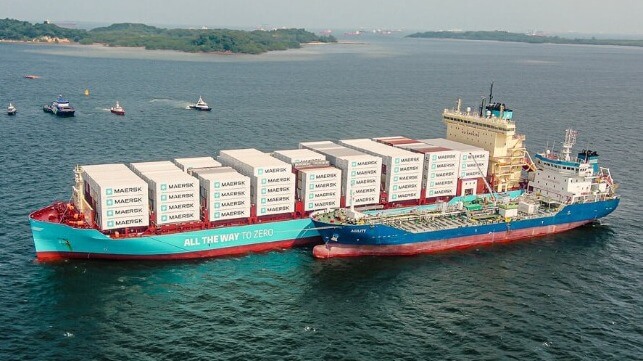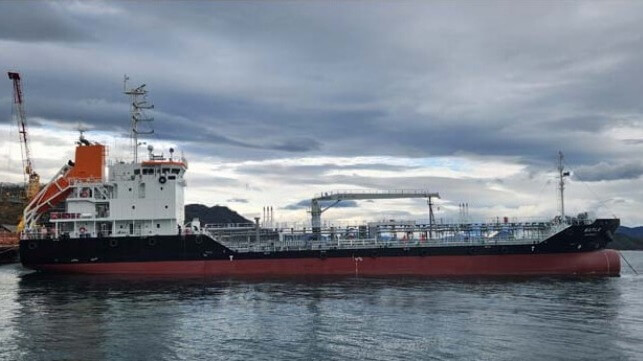Singapore Calls for Proposals for Methanol Bunker Network by 2025

The Maritime and Port Authority of Singapore (MPA) is taking steps to further build out the infrastructure required to support the widespread adoption of methanol as a marine fuel. Today they released a call for proposals for the implementation of end-to-end methanol bunkering solutions following the launch of the port’s first dedicated methanol bunker vessel and efforts to develop the protocols for the new fuel.
In launching the effort to obtain proposals for the bunkering operations, the MPA cites the expected delivery of newly-built methanol-capable vessels in the coming years. The container segment has been moving forward aggressively with orders for dual-fuel methanol-capable vessels. While LNG remains the most favored option, experts have predicted that methanol will overtake other options due to its increasing availability and the planned production of green methanol, as well as the relative ease in handling the fuel versus LNG or ammonia.
The MPA highlights that its call for proposals comes after the recent completion of the world’s first ship-to-containership methanol bunkering operation on July 27, 2023, in Singapore for the Laura Maersk. While Singapore has long been a hub for Asia and the largest bunkering port, Maersk however has selected a route for its first new methanol dual-fuel containership that does not include Singapore. X-Press Feeders also announced plans for its first feeder network with its currently under-construction methanol-capable vessels focusing on Scandinavia and the Baltic.
To ensure a resilient supply of methanol to meet the international bunkering needs in the Port of Singapore, the MPA is inviting interested parties to submit proposals for the supply of methanol as a marine bunker fuel.
The effort focuses on the methanol supply sources, the model for a methanol bunkering operation at a commercial scale in Singapore, and the alternatives for the physical transfer of methanol. Proposals are due by the end of February 2024, and the MPA reports it will assess the viability of various solutions received, which will also inform and shape the development of MPA’s methanol bunkering licensing framework.
The is also working with industry partners to study methanol supplies, infrastructure requirements such as terminal facilities and methanol-carrying bunker tankers, seafarers training, and bunkering standards, as part of the broader effort to operationalize methanol bunkering and supply methanol at scale in the Port of Singapore.
The goal is to have a commercial-scale methanol bunkering infrastructure in place by 2025 to support the emerging fleet of vessels and to maintain Singapore’s role as a leader in bunkering.
Singapore’s First Dedicated Methanol Bunker Ship is Commissioned

Singapore has received its first dedicated methanol bunker vessel, the MT Maple. According to officials at the port, it marks a milestone in the development of the alternative energy sector and will help to accelerate the deployment of methanol as a marine fuel expanding on Singapore’s role as the world’s largest bunker port.
The 4,000 dwt Maple was built by Japan’s Sasaki Shipbuilding as part of an argument signed 14 months ago in Japan involving Global Energy Trading and its subsidiary Stellar Ship Management Services. Bureau Veritas participated in the project and classed the vessel.
The ship’s cargo tanks are specifically coated with inorganic zinc silicates specifically chosen to support the operation as a methanol bunker vessel. They highlighted that the vessel is an IMO Type 2 chemical and oil tanker equipped with twin-screw propulsion, a flow boom, and a mass flow metering system, and is compliant with the current Maritime and Port Authority of Singapore (MPA) licensing requirements for oil product bunker tankers.
A dedicated team from Stellar supervised the construction of the bunker vessel. Stellar is a ship manager for oil and chemical tankers, including managing and crewing the fleet of 20 tankers owned by the Global Energy Group.
Global Energy, which is licensed in Singapore and the UAE as a bunker supplier offers a full range of marine fuels. The vessel will go into service in early 2024 operated by Global Energy and is part of the company’s efforts to expand its offering with dedicated capabilities in biofuel and methanol. A sister vessel, the MT Kara was launched at Sasaki Shipbuilding last month and is scheduled for delivery in March 2024.
“The delivery of Singapore’s first dedicated methanol bunkering vessel is an important step to support the adoption of alternative low-carbon fuels by shipping,” said David Barrow, Vice-President South Asia and Pacific, Marine & Offshore for Bureau Veritas. “By enabling the delivery of methanol to vessels calling at Singapore, the new vessel will contribute to developing the industry’s supply and bunkering capabilities, which are essential in order to scale up those fuels and ensure their availability.”
The delivery of this new bunker comes at a critical time as Singapore looks to play a leading role in the emerging alternative fuel markets. Maersk announced it will be introducing the first of its 18 large methanol dual-fuel containerships in February 2024, but the initial routing skips Singapore on the trips between Asia and Europe.
Last year, Singapore however was one of the ports that participated in the fueling of the Laura Maersk on her maiden voyage from Asia to Europe, becoming the first containership operating on methanol. The Maritime & Port Authority of Singapore reports that it has undertaken a working group to introduce a new bunkering procedure for the safe handling and delivery of methanol as a marine fuel to ships refueling in the port of Singapore.
No comments:
Post a Comment